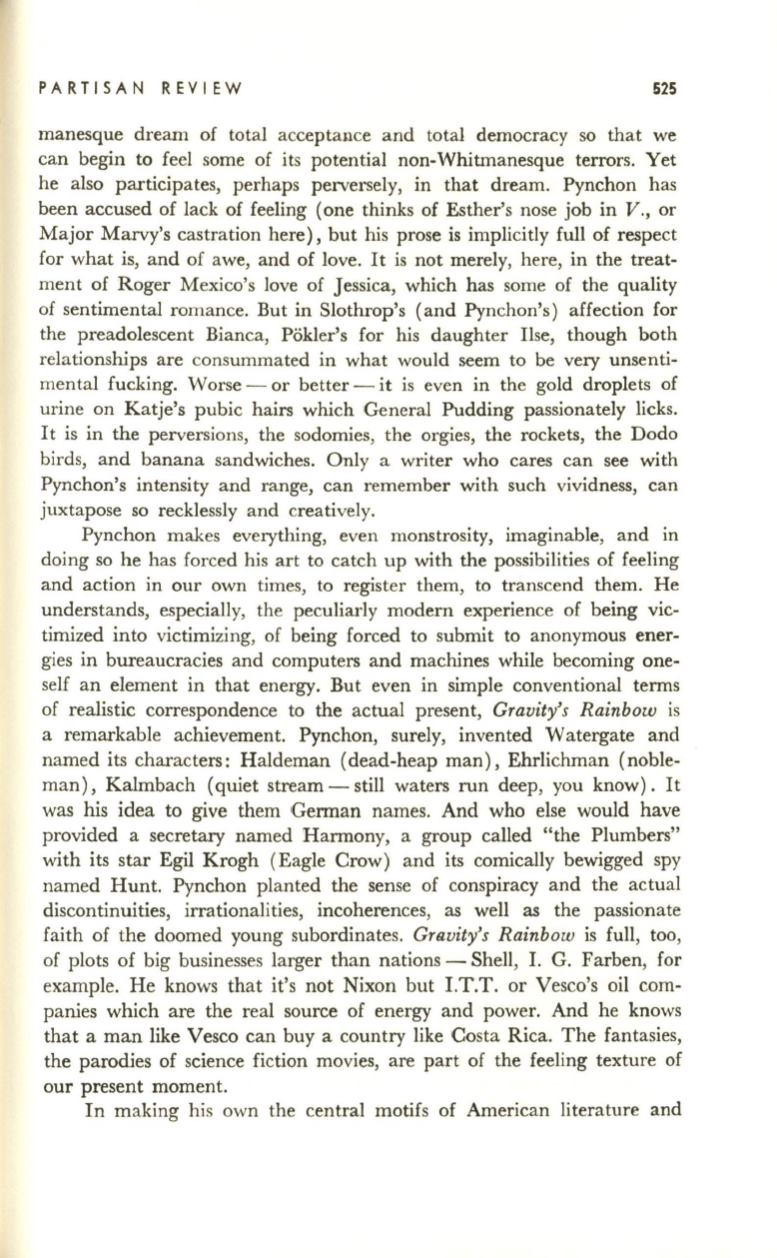
PARTISAN REVIEW
525
manesque dream of total acceptance and total democracy so that we
can begin to feel some of its potential non-Whitmanesque terrors. Yet
he also participates, perhaps perversely, in that dream. Pynchon has
been accused of lack of feeling (one thinks of Esther's nose job in
V.,
or
Major Marvy's castration here), but his prose is implicitly full of respect
for what is, and of awe, and of love.
It
is not merely, here, in the treat–
ment of Roger Mexico's love of Jessica, which has some of the quality
of sentimental romance. But in Slothrop's (and Pynchon's) affection for
the preadolescent Bianca, PokIer's for his daughter Ilse, though both
relationships are consummated in what would seem to be very unsenti–
mental fucking. Worse - or better - it is even in the gold droplets of
urine on Katje's pubic hairs which General Pudding passionately licks.
It is in the perversions, the sodomies, the orgies, the rockets, the Dodo
birds, and banana sandwiches. Only a writer who cares can see with
Pynchon's intensity and range, can remember with such vividness, can
juxtapose so recklessly and creatively.
Pynchon makes everything, even monstrosity, imaginable, and in
doing so he has forced his art to catch up with the possibilities of feeling
and action in our own times, to register them, to transcend them. He
understands, especially, the peculiarly modern experience of being vic–
timized into victimizing, of being forced to submit to anonymous ener–
gies in bureaucracies and computers and machines while becoming one–
self an element in that energy. But even in simple conventional terms
of realistic correspondence to the actual present,
Gravity's Rainbow
is
a remarkable achievement. Pynchon, surely, invented Watergate and
named its characters: Haldeman (dead-heap man), Ehrlichman (noble–
man), Kalmbach (quiet stream - still waters run deep, you know). It
was his idea to give them German names. And who else would have
provided a secretary named Harmony, a group called "the Plumbers"
with its star Egil Krogh (Eagle Crow) and its comically bewigged spy
named Hunt. Pynchon planted the sense of conspiracy and the actual
discontinuities, irrationalities, incoherences, as well as the passionate
faith of the doomed young subordinates.
Gravity's Rainbow
is full, too,
of plots of big businesses larger than nations - Shell, 1. G. Farben, for
example. He knows that it's not Nixon but 1.T.T. or Vesco's oil com–
panies which are the real source of energy and power. And he knows
that a man like Vesco can buy a country like Costa Rica. The fantasies,
the parodies of science fiction movies, are part of the feeling texture of
our present moment.
In making his own the central motifs of American literature and


